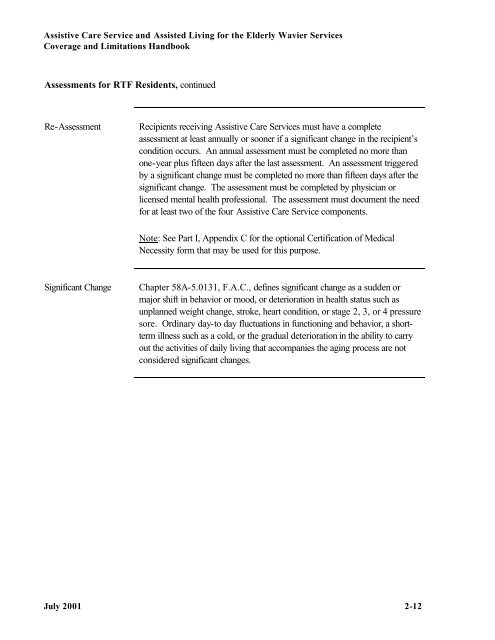Assistive Care Services and Assisted Living for the Elderly Waiver
Assistive Care Services and Assisted Living for the Elderly Waiver
Assistive Care Services and Assisted Living for the Elderly Waiver
You also want an ePaper? Increase the reach of your titles
YUMPU automatically turns print PDFs into web optimized ePapers that Google loves.
<strong>Assistive</strong> <strong>Care</strong> Service <strong>and</strong> <strong>Assisted</strong> <strong>Living</strong> <strong>for</strong> <strong>the</strong> <strong>Elderly</strong> Wavier <strong>Services</strong><br />
Coverage <strong>and</strong> Limitations H<strong>and</strong>book<br />
Assessments <strong>for</strong> RTF Residents, continued<br />
Re-Assessment<br />
Recipients receiving <strong>Assistive</strong> <strong>Care</strong> <strong>Services</strong> must have a complete<br />
assessment at least annually or sooner if a significant change in <strong>the</strong> recipient’s<br />
condition occurs. An annual assessment must be completed no more than<br />
one-year plus fifteen days after <strong>the</strong> last assessment. An assessment triggered<br />
by a significant change must be completed no more than fifteen days after <strong>the</strong><br />
significant change. The assessment must be completed by physician or<br />
licensed mental health professional. The assessment must document <strong>the</strong> need<br />
<strong>for</strong> at least two of <strong>the</strong> four <strong>Assistive</strong> <strong>Care</strong> Service components.<br />
Note: See Part I, Appendix C <strong>for</strong> <strong>the</strong> optional Certification of Medical<br />
Necessity <strong>for</strong>m that may be used <strong>for</strong> this purpose.<br />
Significant Change<br />
Chapter 58A-5.0131, F.A.C., defines significant change as a sudden or<br />
major shift in behavior or mood, or deterioration in health status such as<br />
unplanned weight change, stroke, heart condition, or stage 2, 3, or 4 pressure<br />
sore. Ordinary day-to day fluctuations in functioning <strong>and</strong> behavior, a shortterm<br />
illness such as a cold, or <strong>the</strong> gradual deterioration in <strong>the</strong> ability to carry<br />
out <strong>the</strong> activities of daily living that accompanies <strong>the</strong> aging process are not<br />
considered significant changes.<br />
July 2001 2-12




